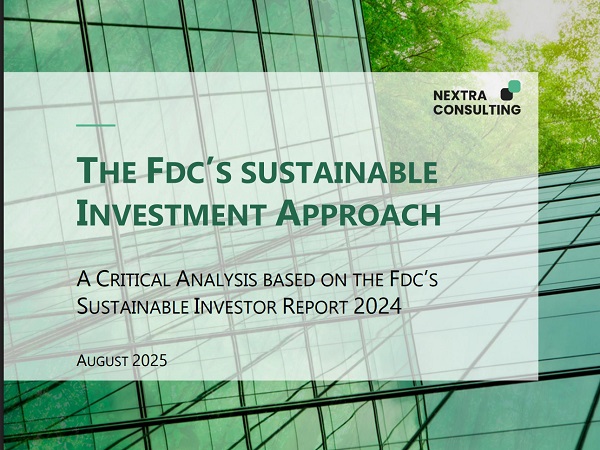 Credit: Nextra Consulting GmbH / Greenpeace Luxembourg
Credit: Nextra Consulting GmbH / Greenpeace Luxembourg
On Wednesday 6 August 2025, Greenpeace Luxembourg and Nextra Consulting GmbH presented a critical analysis of the second sustainability report issued by Luxembourg's sovereign pension fund, the "Fonds de Compensation" (FDC).
Nextra Consulting specialists concluded that the FDC has incorporated very few strategic changes in terms of sustainability since 2020, despite its purported commitments to responsible investments.
Four years after its first sustainability report, the FDC's investment strategy reportedly remains misaligned with the objectives of the Paris Agreement. According to the analysis, the fund's nearly €30 billion portfolio is on a trajectory to contribute to a global temperature rise of 2 to 3°C - far above the 1.5°C target. Identified contributing factors (structural weaknesses) include a lack of ambitious and binding ESG requirements, opaque asset manager selection processes (and their responsibilities regarding corporate engagement) and the fund's refusal to exclude certain sectors from its investments.
"Our analysis shows that the fund's current sustainability strategy carries both ecological and potential financial risks," stated Dr Martin Granzow, Managing Director of Nextra Consulting GmbH. "In our opinion, the long-term effects of the climate crisis and other sustainability-related factors should be taken into greater account in the risk assessment in order to sustainably meet the commitments made to beneficiaries."
According to additional information provided by Greenpeace, the FDC SICAV-FIS annual report published in May also reveals alarming figures. In 2024, the pension fund invested more than €1.3 billion in leading coal, oil and gas companies, an increase of more than 46% compared to 2022. As reported by Greenpeace, these investments include €174 million in more than 160 coal companies such as BHP Billiton, EnBW Energie Baden-Württemberg, Duke Energy, Glencore and RWE, as well as almost €1.2 billion in some 250 oil and gas companies, including ExxonMobil, TotalEnergies, Shell and Chevron, as well as in companies such as Siemens and Microsoft, which are involved in expanding the capacity of new fossil fuel power plants. In addition, the fund invested €152 million in companies responsible for deforestation, such as JBS, the world's largest meat producer.
"Paradoxically, the FDC highlights the supposedly positive effects of its portfolio in its report, while the verifiability and traceability of this information are very limited," said Sarah Hirsch, a consultant at Nextra Consulting. "The fund also boasts that all its actively managed assets have obtained the LuxFLAG label. However, it should be noted that these labels alone do not allow us to assess the fund's actual impact on its sustainability objectives."
"The Luxembourg government and FDC officials are acting irresponsibly by investing taxpayers' money in companies that have no place in an institutional investor's portfolio," commented Martina Holbach, campaigner at Greenpeace Luxembourg. "Climate protection is a human right. The International Court of Justice recently confirmed that states must respect the 1.5°C limit and exercise due diligence to ensure that their climate policy is consistent with international objectives. A state that fails to prevent significant damage to the climate system is violating international law and incurring liability. The FDC must end its climate-killing investments."
To address the reported shortcomings, Nextra Consulting specialists have recommended that the FDC establish clear and ambitious sustainability standards for the selection of asset managers, implement rigorous monitoring processes, and improve transparency regarding sustainability indicators and corporate engagement requirements.
Greenpeace, for its part, has urged the Luxembourg government and the FDC to immediately align the fund's investments with the objectives of the Paris Agreement and comprehensively consider sustainable development issues.
The full analysis report is available (in English) here.








